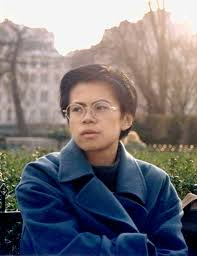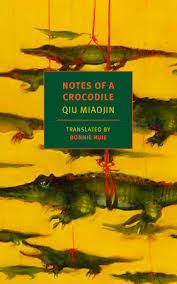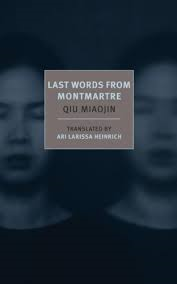“Notes of a crocodile” (1) is a short novel, published in Taiwan in 1994, translated two years ago by Bonnie Huie for the prestigious New York Review Books collection, which had already published Qiu Miaojin’s best-known book “Last Words from Montmartre” (2).

It took more than twenty years for “Notes…”, which is a famous book in Taiwan, to be translated, a reference, a kind of lesbian code at the time. Qiu Miaojin, a writer of counter-culture, is the first openly lesbian author; part of her fame comes from her suicide in Paris in 1995, the premises of which can be read in “Last Words…” and which was discussed in January 2016.
– The heroine of the novel, Lazi:

The novel does not provide any information about her family or her childhood. The book begins at university; she is brilliant, she succeeds easily even without much effort and with limited attendance.
It was a period of profound transformations for Taiwan with, in 1987, the end of martial law after forty years, an explosion of literary movements and demonstrations by students in Taipei (Wild Lily in 1990) after those in Tiananmen in 1989. We can link this period of openness to the importance of cultural references in the book: Japanese literature, cinema, Jean Genet…
Taipei is an important character, she speaks to us emotionally about her city with pleasant descriptions even if her housing conditions are not always very comfortable.
– Her love for Shui Ling:
Lazi is very specific: “I am a woman who loves women…The first time I saw you, I knew I would fall in love with you. That my love would be wild, raging and passionate but also illicit”. (p.22).
Her name, Lazi, has become a slang term for lesbians. Shui Ling is a student like her, their relationships will be difficult and not very fulfilling. Lazi does not want to depend emotionally on Shui Ling and thinks that this relationship may not last; she does not want to suffer from a break-up that seems inevitable to her.
She fears not to be loved for herself and wants to be convinced that she cannot love men. She refuses norms but is very sensitive to social pressure; however, hiding is actually a way of denying herself.
A relationship with crises, break-up, which seems to end but which resumes after a few months. Lazi abandons her but suffers from it. A few months later, Shui Ling cannot be found, she is with another woman….
– A novel or rather a confession:
The autobiographical character is obvious, and the book unfolds as a series of meetings without a very elaborate plan, meetings with women but also with young homosexuals.

Despite Lazi’s great energy, the tone is one of a confession. It is certainly not a militant novel or an essay. The texts are short, not very literary with many cultural references. It is a series of eight Notebooks with many episodes on Crocodiles.
Who are these crocodiles dressed as men? Gays seen by the media. At the time, homosexuals do not hide as much and this was of great interest to the media as always looking for an audience. The passages on Crocodiles, their activities, their comments are rather disappointing and without much humour.
We can’t take them seriously and it’s not very interesting; they take up too much space but it’s a kind of interlude, probably positive because we would risk being saturated with Lazi’s rather sad life.
She is very isolated and spends a lot of time alone in her room. Without friends on her twentieth birthday and yet she has many contacts but she separates herself from the others voluntarily.
– Isolated during her college years:
Classes, clubs, university contacts allow her to meet many people, with two young students, Tun Tun and Zhi Rou, in love with each other, who later experienced disappointing relations with men.
Lazi would like to believe that she can love a man. Relationship with Meng Sheng, a brilliant student, wealthy but suicidal and ultimately hooked on drugs. He had a close relationship with Chu Kuang; they broke up after four years but meet every April 1, the date of their break-up. “It was an illicit love, a thing so dangerous…but it had no future. Eventually, women entered in the picture…His interest in me gradually waved…He was shameless spending all his time with women” (p.111).
Later we will learn that Chu Kuang lives with an 18-year-old sailor from the Naval Academy. We know very little about Chu Kuang and even less about the sailor. Not really interesting, a low quality padding!
As for Lazi, she meets Xiao Fan, five years older than her, a depressed woman who has had a fiancé for over ten years and who finally decides not to marry her. Lazi lives with her and seems happy but she worries Xiao Fan who is afraid of Lazi’s love. They do not really understand each other and for Lazi it’s not really love! It is difficult to follow and understand all these failures; we are not far from the unfortunate passion in Montmartre (2)… All this will end with the graduation ceremony!
Bertrand Mialaret
(1) Qiu Miaojin, “Notes of a crocodile”, translated by Bonnie Huie, New York Review of Books, 2017, 240 pages.
(2) Qiu Miaojin, “Last Words from Montmartre”, translated by Ari Larisa Heinrich. New York Review of Books, 2014, 160 pages.
The French translation by Emmanuelle Péchenart was published in October 2018 by Editions Noir sur Blanc with a preface by Hélène Cixous.





